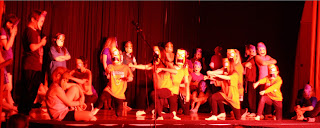A CASE FOR SMALLER CLASSES
Why would smaller class sizes increase student performance?
This video is from last Friday when 10 students were away... leaving only 18 students in the class. It was quite a unique situation - 5 boys were away at a rugby tournament and the rest were away for medical reason. From the start of the day the class was immediately settled and engaged, working on items from their tasklist. The loudest noise was the Relish the rainbow lorikeet in the cloakroom.
I was so taken with the difference in the class I videoed the children at work - as evidence of how smaller class sizes may benefit children's learning. What was even more powerful was the feedback from the students themselves. My questions was, "Who thinks that with today's quieter classroom you were better able to learn?" Every hand went up!
While this is not definitive proof of the effects of smaller classes it does lend strong support to that notion.
While the children worked I marked and checked the handed in work from my "Checking Box", and marked off completed tasks. I was able to call students up individually to go through their work and give feedback and next steps to help them further develop their learning.
In the ideal world the daily experience in the classroom - it would be the norm for the class and the ease of interaction with the class would mean greater levels of achievement for all students, and less stress for teaching staff..

























